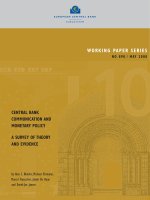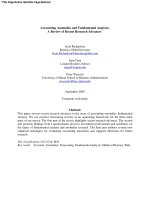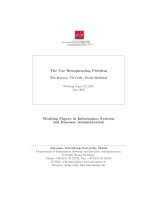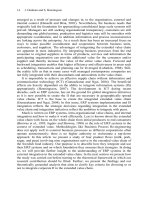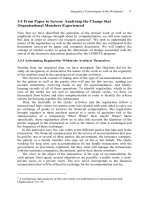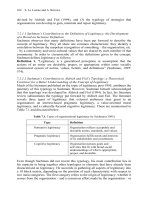Information systems and technologies in accounting and taxation as a means of integration into the digital economy
Bạn đang xem bản rút gọn của tài liệu. Xem và tải ngay bản đầy đủ của tài liệu tại đây (383.35 KB, 10 trang )
International Journal of Management (IJM)
Volume 11, Issue 2, February 2020, pp. 122–131, Article ID: IJM_11_02_013
Available online at />Journal Impact Factor (2020): 10.1471 (Calculated by GISI) www.jifactor.com
ISSN Print: 0976-6502 and ISSN Online: 0976-6510
© IAEME Publication
Scopus Indexed
INFORMATION SYSTEMS AND
TECHNOLOGIES IN ACCOUNTING AND
TAXATION AS A MEANS OF INTEGRATION
INTO THE DIGITAL ECONOMY
Yaroslav Izmailov
Department of Tax Policy, University of the State Fiscal Service of Ukraine,
Irpin city in Kiev Region, Ukraine
Dmytro Pilevych
Department of Management Accounting, Business Analytics and Statistics,
University of the State Fiscal Service of Ukraine, Irpin city in Kiev Region, Ukraine
Liubov Shevtsiv
Department of Accounting and Auditing,
Ivan Franko National University of Lviv, Lviv, Ukraine
Yuliia Petlenko
Department of Finance, Taras Shevchenko National University of Kyiv,
Kyiv, Ukraine
Olha Driha
Department of accounting and audit,
National Technical University Dnipro Polytechnic, Dnipro, Ukraine
Antonina Lagun
Department of International accounting and auditing,
Vadym Hetman Kyiv National Economic University, Kyiv, Ukraine
ABSTRACT
In the context of the transition from an industrial society to an information society
and the formation of a knowledge economy based on the intensive development of
digital technologies, prerequisites have emerged for the emergence of a new neoeconomics information environment with a predominance of intangible value creation
factors, new business processes and social and humanistic priorities. Such changes
certainly affect the entire system of information support of socio-economic processes,
in which accounting, with its functionality for collecting, processing and providing
/>
122
Yaroslav Izmailov, Dmytro Pilevych, Liubov Shevtsiv, Yuliia Petlenko, Olha Driha, Antonina Lagun
economic information on the activities of business entities, plays a traditionally
significant role.
The article discusses the main directions of modernization of accounting in the
digital economy and the information society. In particular, an assessment is given of
the theoretical premises, and the possibility of changing the accounting paradigm, the
development of the accounting concept and its elements, the issues of structuring the
accounting system by types of accounting are considered, the criteria for their
selection and development trends are determined. The key factors of the influence of
digital technologies on the methodology and methods of accounting are identified, the
possibilities of their expansion and modernization are determined. Also in the context
of the development of hybrid and intangible forms of capital, the virtualization of
monetary and non-monetary units of value, the expansion of non-financial target
characteristics of economic entities, the main trends in the development of accounting
objects, criteria for their recognition and metrics are determined.
Keywords: Accounting, Digital Economy, Information Systems, Integration,
Taxation, Technologies, Transactions.
Cite this Article: Yaroslav Izmailov, Dmytro Pilevych, Liubov Shevtsiv, Yuliia
Petlenko, Olha Driha, Antonina Lagun, Information Systems and Technologies in
Accounting and Taxation as a Means of Integration into the Digital Economy,
International Journal of Management (IJM), 11 (2), 2020, pp. 122–131.
/>
1. INTRODUCTION
Global changes in the role of information as a factor in social life have identified the
transition to the information society and the formation of a digital economy, which are
characterized by humanitarian priorities, the dematerialization of value creation factors and
the transformation of the information environment for supporting business models and
ecosystems, as the main trend in social and economic development. One of the trend areas in
this context is the development of the digital economy [1-3].
Such changes affect the entire system of information support for socio-economic
processes, in which accounting has traditionally played a significant role with its functionality
for collecting, processing and providing economic information on the activities of business
entities [4-5].
It may be said that materialism has made people focus only on money and money-making,
as a result eradicating the spiritual values. Due to this deterioration of spiritual values, people
are dispirited, stressed and lack concern for fellowmen. This has led to a decline in work
performance at the individual level. Spiritual intelligence may address this fundamental
challenge currently faced by a business.
Accordingly, issues of rethinking the role and place of accounting in the information,
including the digital economy, the study of changes in its substantial, methodological and
conceptual foundations under the influence of the technological and digitalization capabilities
and requirements for information content are becoming relevant [6-7].
The relevance of research in this area is also due to the fact that in recent decades
problems have been identified associated with a decrease in the functionality of accounting
and the usefulness of reporting information for a number of stakeholders, which
predetermined numerous studies devoted, at a fundamental level, to revisions of his theory,
concepts and paradigms, analysis Roles in the formation of the information environment for
/>
123
Information Systems and Technologies in Accounting and Taxation as a Means of Integration into the
Digital Economy
managing economic processes, and at a practical level - the search for specific ways of
updating accounting and increasing relevance ty of his information.
2. METHODOLOGY AND OBJECTIVES OF THE STUDY
The feasibility of developing a new concept, theoretical principles and practical
recommendations for the modernization of accounting is determined by a number of factors:
the allocation of information and as a key factor in creating value, a guide to non-financial
target priorities, the development of hybrid and intangible forms of capital, the formation of a
global digital environment, the virtualization of value units, assets, liabilities and related
transactions (Fig. 1).
Figure 1 The main factors affecting the development of accounting in the digital economy
These factors have a significant impact on the accounting methodology, principles,
procedures, content orientation and characteristics of the information product, internal
structuring and allocation of types and clusters of accounting, definition and systematization
of accounting objects, development of criteria for their identification and taxonomy, metrics
and descriptors.
The construction of a conceptual model of accounting, which includes a set of theoretical
developments that determine the logic, structure and principles of the functioning of the
accounting system in the digital economy, seems to be a priority. In particular, it is advisable:
carry out the positioning of accounting and its components in the information environment of
the global ecosystem, to evaluate its capabilities for solving a new level of socio-economic
problems;
analyze the impact of the digital economy on the paradigm, concepts, objects, methodology,
structuring and organization of accounting;
identify the possibilities and directions of modernization of accounting in the conditions of
capitalization of knowledge and other intangible factors of economic and social growth,
digitalization of socio-economic processes, the development of crypto economics and smart
society, virtualization of economic relations and value objects;
develop some essential regulatory documents defining the methodological and methodological
foundations of accounting and its infrastructure support in the digital economy.
The theoretical basis of the research is the methodology and general scientific principles
of conducting complex research, which include empirical - observation, comparison,
/>
124
Yaroslav Izmailov, Dmytro Pilevych, Liubov Shevtsiv, Yuliia Petlenko, Olha Driha, Antonina Lagun
description, measurement, experimentation, theoretical and cognitive - formalization,
axiomatic method, hypothesis and hypothesis testing, hypothetical-deductive method,
climbing from abstract to concrete and general logical - analysis and synthesis, scientific
abstraction, generalization, idealization, induction and deduction, analogy, descriptive and
analogue model education, systematic approach, structural-functional, probabilistic-statistical,
comparative legal methods.
The intensification of scientific research in the field of development of accounting as a
science and a form of practical activity that meets the requirements of the modern economic
environment is confirmed by a significant number of developments defined by scientists as
paradigms, theories, concepts and types of accounting.
The formation of a new conceptual accounting model requires an integrated approach,
which is ensured by the implementation of a number of interconnected elements presented in
Fig. 2.
Figure 2 Scheme of a conceptual accounting model formation in a digital economy
The modern accounting paradigm can be defined as digraphic (in other systemic terms economical and dynamic). Assuming that the double-entry is the basis of the current paradigm
and has not exhausted itself as its methodological basis, it is more reasonable to consider that
so far we are talking more about research approaches and methods within the framework of
the existing digraphic paradigm.
Today's digital technologies, for example, blockchain, are already interpreted as a
prerequisite for a revolution in accounting methods, accounting registration systems. Instead
of generating and locally storing individual transaction records, enterprises will be able to
write them into a unified register, creating a distributed and interconnected network of reliable
accounting information. Since all records are distributed and cryptographically protected,
their falsification or destruction becomes almost impossible. Bitcoin Magazine calls this a
triple account. This is not about changing the digraphic record to unigraphic, triple, quadruple,
etc., but about the method of registering and storing the database of economic facts, which
can be developed into a database of generalized data, financial and non-financial reports and
filters of their reliability, a communication tool and ensuring the functioning of the global
information economic environment.
An example is the development of management accounting, which is much more mobile
in the methodological plan, which not only relies on traditional accounting methods but also
/>
125
Information Systems and Technologies in Accounting and Taxation as a Means of Integration into the
Digital Economy
actively adopts the methods of related areas of management activity - planning, analysis,
forecasting, modelling, etc.
The elements of the method do not become legally defined procedural components, but a
multivariate management tool, in particular:
the assessment can be carried out using various approaches (for example, at investment,
market, insurance, book value, liquidation value) and multiple units of measurement;
calculation can be carried out using a wide variety of techniques, and in management
accounting allows you to determine different costs for different purposes;
it is possible to use or not use accounts and double entries;
the fact, the frequency of preparation and the content of the balance sheet and reporting are
determined by the principle of profitability; it is advisable to compile forecast, segmental
balances, iterative methods for its construction.
The formation of the information environment of the digital economy has an impact on
the development of all the basic elements of the accounting method.
Accounting objects in the information society and digital economy are also undergoing
significant changes. First of all, this is due to the fact that there is a gradual expansion for the
reporting users of a range of indicators characterizing not only economic efficiency, but also
environmental safety, social responsibility of the business, strategic orientation, systematic
and quality corporate governance, the presence of organizational, innovative, human,
reputational capital and other non-financial objects that provide the basis for value creation. In
Fig. 3 presents new types of non-financial accounting objects in the information economy.
Figure 3 New types of accounting objects in the information economy.
Besides, the range of objects is expanding due to new, hybrid and modifiable forms of
assets, liabilities and capital. Reflecting them in accounting does not just require the addition
of existing methods, but the formation of new principles for the systematization and
taxonomy of accounting objects, identification of criteria for their recognition, metrics,
descriptors and principles of reflection in the system of economic information.
Also, it is essential to internal structuring of accounting and the allocation of its new types
- those that are in demand and objectively existing. Pronounced trends in this area are the
convergence of existing models of accounting and attempt to identify new ones, such as
strategic, adaptive, multi-purpose, creative, intellectual, etc.
/>
126
Yaroslav Izmailov, Dmytro Pilevych, Liubov Shevtsiv, Yuliia Petlenko, Olha Driha, Antonina Lagun
One of the essential parts of the accounting system is the information component of two
subsystems - financial and management accounting. A reorientation from a control function to
an informative one is noted, based on the organization of digital transformation points of an
enterprise. At the same time, IT-technologies cause significant modifications both in the
methodology and in the applied direction of accounting science (Fig. 4).
Figure 4 New types of accounting objects in the information economy
2.1. Directions of Development of Accounting Methodology
Of particular note is the study of the possibilities of evaluating new accounting facilities,
which are human intellectual capital, customer base, innovative products, R&D results, etc.
There is an inclusion in the accounting system of non-financial information (the quality of the
client base, the state or implementation of social responsibility, the presence of economic
security risks, the degree of application of energy-saving technologies, etc.). Modern
developments of new information technologies, such as cloud technologies, open technology
platforms, electronic reference and information systems, the creation of a single international
format and content of financial statements in electronic form XBRL, are taking place.
2.2 Accounting Automation Software in the Digital Economy
To date, the stage of development of information technology allows you to fully appreciate all
the advantages and all the importance of automation of accounting in organizations of various
sizes and areas of activity. To solve the difficult tasks of a company of various kinds and
specifics, it is enough just to choose the right software and study the process of its use.
Indeed, on the part of business processes, all organizations are not much different from each
other, which enables developers to create universal programs.
In addition to financial management, the accounting program can and should do more to
optimize other business processes related to the company's operations. Payroll, inventory, cost
tracking - these are just some of the most critical tasks in which the accounting system should
be integrated. Based on this, we compare the three most popular accounting systems of 2019
(according to FinancesOnline - Best Accounting Software 2019 Award): FreshBooks;
/>
127
Information Systems and Technologies in Accounting and Taxation as a Means of Integration into the
Digital Economy
NetSuite ERP; Sage 50cloud. Each of these programs has its advantages, and the essence of
the comparison takes into account the main features of accounting.
2.2.1. FreshBooks (Fig. 5)
FreshBooks is a system for automating billing, changing them with a more straightforward
interface, as well as for tracking costs and customers. Using this service, you can send and
manage accounts much faster, collect all payments in one interface. At the same time, the
platform supports credit cards, Google Checkout and PayPal.
Figure 5 FreshBooks
A key feature of FreshBooks is that it is based on a cloud service that provides access
from anywhere and security. The program also has a mobile application that allows you to use
it outside the office. Among other things, it has an easy-to- A key feature of FreshBooks is
that it is based on a cloud service that provides access from anywhere and security. The
program also has a mobile application that allows you to use it outside the office. Among
other things, it has an easy-to-understand interface, which makes it easy to use.
Key Features of FreshBooks: Online Invoicing; Expense Tracking; Time Tracking; Projects;
Payments; Accounting Reports & Taxes.
2.2.2. NetSuite ERP (Fig. 6)
NetSuite is a single online business management suite, including enterprise resource planning
(ERP), financial management, customer relationship management (CRM) and e-commerce.
The system is built on a modular basis, so you can use the full range of business software or
start with either NetSuite Financials or NetSuite CRM modules, adding the missing features.
NetSuite includes project control, resource management, project accounting, and cost
management.
Figure 6 NetSuite ERP
/>
128
Yaroslav Izmailov, Dmytro Pilevych, Liubov Shevtsiv, Yuliia Petlenko, Olha Driha, Antonina Lagun
NetSuite ERP - accounting software for large companies. It is a multi-functional business
management platform. With it, users can make faster daily financial transactions. This is done
using many management functions.
One of these functions is supply chain management. With it, you can analyze needs and
view sales forecasts to create a business plan.
Key Features NetSuite ERP: Accounting; Fixed Asset Management; Payment Management;
Demand Planning; Inventory Control and Warehouse Management; Purchasing and Vendor
Management; Manufacturing; Billing Management and Invoicing.
2.2.3. Sage 50cloud (Fig. 7)
Sage 50cloud - accounting software for individual entrepreneurs and small companies. It has
three levels of service, and the upper level allows more than 11 users to work. Its functions
include tasks such as paying bills, billing, and managing expenses. The uniqueness of the
platform is that it is a hybrid desktop application with a cloud component for accessing and
storing data. The software can be used to track purchases and suppliers and pay bills. It also
has expense management features that include mobile payments and banking channels. The
product can be connected to bank accounts, allowing real-time registration of sales and
receipts, tracking receivables, transferring funds, checking bank accounts and making
deposits. It also provides access to financial reports from any online device.
Figure 7 Sage 50cloud
Key Features of Sage 50cloud: Activity dashboard; Activity tracking; Automate purchase
orders; Automated backup; Automated billing; Bank reconciliation; Batch processing; Billing
& invoicing; Budgeting & forecasting; Cash flow statement; Collaboration tools; Consolidate
financials; Contact database; Contact management; Control budgets and departments; Custom
pricing; Customizable branding; Customizable templates; Drag & drop interface; Electronic
payments; Financial analysis; Financial management; Forecasting; Inventory management &
optimization; Invoice management & processing; Job costs, estimates, and invoicing; Mobile
integration; Multi-currency; Order management & tracking; Pay bills electronically, print
paper checks; Project budgeting; Project time tracking; Purchase order management;
Purchasing; Quote management; Receipt management; Sales orders; Supplier management;
Tax management; Templates; Transfer management; Trend analysis.
3. RESULTS ANALYSIS
Currently, computer networks (local, regional, global) are being introduced everywhere,
thanks to which remote access to network-wide resources is provided (databases, computers,
/>
129
Information Systems and Technologies in Accounting and Taxation as a Means of Integration into the
Digital Economy
printers, fax modems, etc.). The applied information technologies are an indicator of the
“armament” of managerial work, a characteristic of potential capabilities of the enterprise
(organization) management system as a whole. Recently, the requirements for computer skills
of users have increased significantly.
Choosing the best accounting software for a company is quite difficult. It is necessary to
focus on the main tasks that the component should solve, since different programs have a
different range of functionality, prices, devices, etc. The table below shows the comparative
characteristics of accounting programs.
Table 1 Compare FreshBooks, Sage 50cloud and NetSuite ERP by main features
Main features
FreshBooks
Sage 50cloud
NetSuite ERP
SmartScore ™ by FinancesOnline
9.8 / 10
9.7 / 10
9.6 / 10
Customer Experience
99%
100%
99%
Pricing (Starting from)
$15
$44.97
by quote
Monthly payment
Annual
Subscription
Monthly payment
Quote-based
Pricing Model
Monthly payment
Annual
Subscription
Language Supported
English
Turkish
Dutch
Polish
Swedish
English
English, Chinese,
German,
Japanese, Spanish,
French, Russian,
Italian, Dutch,
Portuguese,
Turkish, Swedish
Available Devices
Windows, Android,
IPhone/IPad, Mac,
Web-Based
Windows,
Android,
IPhone/IPad,
Web-Based
Windows,
Android,
IPhone/IPad, Mac,
Web-Based
For Company Size
Small Business
Freelancers
Small Business
Large Enterprises
Medium Business
Small Business
Large Enterprises
Medium Business
Available Support
Email, Phone, Live
Support, Training,
Tickets
Phone, Training
Email, Phone,
Training, Tickets
To summarize the comparison of accounting systems. For small and medium-sized
businesses and fast-growing startups, FreshBooks is better suited in terms of scalability,
intuitiveness, and pricing. The Sage 50cloud program is aimed at the same market. NetSuite
ERP is best suited for enterprises. For small transactions, using NetSuite ERP is inconvenient.
4. CONCLUSION
Accounting is rightly called the language of business. On the one hand, it is possible to
describe the economic activities of any business entity, and on the other hand, accounting
records provide a reliable picture of the organization’s activities, its financial and property
status.
/>
130
Yaroslav Izmailov, Dmytro Pilevych, Liubov Shevtsiv, Yuliia Petlenko, Olha Driha, Antonina Lagun
That is why it is essential to know this language not only for professional accountants but
also for a full circle of specialists related to economics. For example, managers, financiers,
investors, business appraisers, professionals in the field of enterprise automation.
The development of accounting information technology in recent years is growing. Any
practising accountant works on a computer and does not think of his professional activities
without him. Modernization ("upgrade") and the change of generations of computer
technology, the transition to new operating systems, updating versions of application
programs, etc. is a characteristic feature of modern computerization.
REFERENCES
[1]
Y. O. Izmaylov, Developing the System of Accounting and Taxation of Operations with
Securities, July 2019, DOI: 10.32983/2222-4459-2019-7-231-239
[2]
Nataliia Ostapiuk, Julia Stashenko, Systemization of accounting and taxation approaches
of commission operations, December 2018, DOI: 10.15587/2312-8372.2019.168376
[3]
Mates Dorel, Puscas Adriana, Ursachi Antonela, Ajtay Eduard, The influence of
accounting system regarding accounting and taxation of entities, June 2016, DOI:
10.1515/jles-2016-0006
[4]
Bashynska I.O. Using the method of expert evaluation in economic calculations, Actual
Problems of Economics, 7 (169), 408-412. 2016
[5]
Nada Petrusheva, Darko Iliov, The flaws of the system of accounting for the value-added
tax liabilities and receivables, and recommendations for overcoming them, December
2018, DOI: 10.35120/kij28051613N
[6]
J. Atsu Amegashie, Asymmetric Information, Taxation, and Fiscal Accountability, May
2012, SSRN Electronic Journal, DOI: 10.2139/ssrn.2016606
[7]
A.M. Hadi, A.R. Abed, H.O. Kadim, The role of forensic accounting and its relationship
with taxation system in Iraq, Academy of Accounting and Financial Studies Journal,
22(4), 2018
[8]
D. Pradhan, Dr. P.K. Swain and Dr. M. Dash, Effect of Management Accounting
Techniques on Supply Chain and Firm Performance – An Empirical Study, International
Journal of Mechanical Engineering and Technology, 9(5), pp. 1049–1057. 2018
[9]
Reepu, Employee Related Accounting at NFL. International Journal of Management,
9(1), pp. 1–5, 2018
[10]
Musarrat Ara and Dr. Harani B, Environmental Accounting and Reporting: A Case Study
of Universities’ Educational Curriculum. Journal of Management, 5(4), pp. 349–362,
2018
[11]
Muhammed Zakkeer M., Jerry Varghese, S. Jose, S.R. Devadasan, Implementation and
Financial Accounting of Quality Training and Education Programmes in a Plastic
Products Manufacturing Company, International Journal of Advanced Research in
Engineering and Technology, 4(5), pp. 176–187, 2013
/>
131

